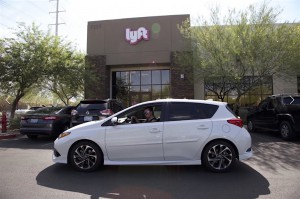
In addition to the presidential part of the election, the auto industry closely monitored the voting across the country, including Uber and Lyft appearing to get their prayers answered in California with the passage of Proposition 22.
The two ride-hailing companies were locked in a legal battle with the State of California to determine if the companies’ drivers should be classified as employees or independent contractors. A recent Supreme Court decision upheld the law, which was passed in 2019, granting them employee status.
However, it seems the voters of California disagree with the courts, voting to approve a ballot measure classifying the drivers as independent contractors by an overwhelming majority 58.4% to 41.6%. It should be noted nearly three-quarters of all ballots had been counted at the time this story was written.
(Uber, Lyft lose again on California contractor issue.)
Uber and Lyft repeatedly claimed that if drivers were legally classified as employees they couldn’t afford to operate in California. In August, just hours before Lyft was going to shutter its service due to the mandate a federal judge temporarily blocked the law. Uber wasn’t clear if it planned to follow Lyft’s lead at that time.

Since then, the two companies have been joined by other “gig services” like Instacart and DoorDash, not only decrying the evils of the law, but also plowing more than $200 million into a campaign to help get the measure passed.
The two companies have remained quiet as ballots continue to get counted to ensure victory, but Uber CEO Dara Khosrowshahi retweeted a missive from Jason Calacanis, who was one of Uber’s first investors, criticizing Lorena Gonzalez, the assemblywoman who introduced AB5, calling her a “grifter.”
“The reason @LorenaSGonzalez failed to hand gig workers over to the big-money unions is because gig workers are smart, successful & simply don’t want grifters like her telling them how and who to work for,” Calacanis tweeted. Khosrowshahi later deleted his retweet. Gonzalez claims that some gig workers make less than minimum wage because of the lack of support from the companies they hustle for.
(Uber, Lyft get last-minute reprieve ahead of California shutdown.)
However, at least two groups representing drivers – Gig Workers Rising and Rideshare Drivers United – opposed the measure.
“We were outspent 20:1. We were outgunned. But we haven’t gotten this far because it was easy. We are fighters. And we punch above our weight. We stand strong when we stand together. We will fight – in the courts, in Sacramento and in the streets,” Nicole Moore, a driver and organizer with Rideshare Drivers United, wrote in a tweet, adding later the group isn’t giving up and will try to form a union of app-based workers.

In the meantime, the passage of Prop 22 is giving Uber and Lyft a boost to each company’s stock price. Lyft is up more than 10% in early afternoon trading, coming in at $28.89 a share, a jump of $2.68 per share. Uber stock is faring even better, rising 12.6% during the same time frame. Shares are up $4.53 to $40.30 each.
The new measure isn’t a complete win for the companies as it requires them to provide some benefits, including minimum pay rates, healthcare subsidies and accident insurance.
However, that’s well short of many of the benefits that many full-time employees enjoy, such as full healthcare, paid vacation time and maternity leave. In an email to its California drivers last night, the company said it planned to implement those new offerings “as soon as possible,” with more information coming in the weeks ahead, Reuters reported.
(Uber, Lyft hit by decision declaring drivers are employees.)
“The future of independent work is more secure because so many drivers like you spoke up and made your voice heard – and voters across the state listened,” the Uber email said.







